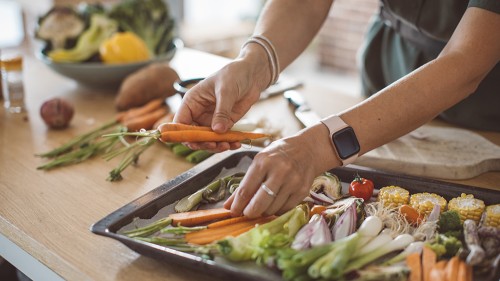WellnessVerge is reader-supported. We may earn a commission when you make a purchase through the links on this page. Learn more about our process here.
Intuitive Eating: A Detailed Beginner’s Guide and How to Start
Published on January 25, 2022
Medically Reviewed by Ana Reisdorf, MS, RD
Curious if intuitive eating is for you? Intuitive eating is an eating approach that teaches you how to become in tune with your body’s internal hunger and fullness signals for better health. In this article, we’ll discuss everything you need to know about intuitive eating and how to start.


What Is Intuitive Eating?
Intuitive eating is a way of eating that focuses on trusting your body and your inner wisdom around your food choices. It is in contrast to any diet that places rules and restrictions around what you can and can’t eat.
In fact, the definition of intuitive eating is otherwise known as an anti-diet approach.
In essence, eating intuitively is trusting your own “nutrition intuition,” which has become an incredibly popular way of eating for those who want to improve their relationship with food, embrace body positivity, and stop the endless cycle of yo-yo dieting.
Unfortunately, the vast array of weight-loss diets and fads over the years have made it harder for us to know how to eat intuitively.
These pressures and rules placed on eating have made it increasingly difficult to know what, when, and how we should eat to feel our best.
The good news is that eating intuitively is a skill we as humans possessed innately when we were born, so we can develop it again to improve our physical and mental well-being.
History of Intuitive Eating
The concept of intuitive eating has been around for several decades but was officially coined as a term in 1995. (1)
Two well-known registered dietitians, Evelyn Tribole and Elyse Resch, founded the principles of intuitive eating and slowly began to create all of the resources available on the approach today.
Babies are born with the ability to eat intuitively, which is evident in how they eat.
Babies (and toddlers) typically cry or speak up when they’re hungry and stop when they’re full. They don’t clean their plates if they’re full, because physically, they recognize they’ve had enough.
Unfortunately, they begin to move away from this natural intuition as they grow. Over time, we tend to lose that innate skill because our society doesn’t necessarily support it.
We live in a culture that teaches us to ignore our body’s hunger signals. We learn either to ignore our hunger if we’re dieting, or to continue eating past the point of fullness if the food tastes good.
This way of eating is the exact opposite of intuitive eating, and when you eat this way for a certain length of time, it can be difficult to know if you’re actually hungry.
It also makes it hard to determine if you’re eating out of actual physical hunger, or for another emotional reason.
Who Is Intuitive Eating For?
Intuitive eating is for anyone who wants to have a healthier relationship with food and improve their overall health. If you can relate to any of the following, you may want to consider intuitive eating:
- You don’t want to follow a diet with rules or restrictions
- You want to heal your relationship with food
- You want a sustainable way of eating
- You want to be able to eat what you want
- You want to gain control over your eating habits
- You don’t want to feel guilty or shameful for eating a certain way
- You want to improve your mindset around food
Additionally, those with an eating disorder, digestive issues, food allergies, athletes, or who just feel unhappy with the way they’re currently eating can consider and explore the concepts of intuitive eating.
While there are some skeptics, there are several research-backed benefits to intuitive eating.
Benefits of Intuitive Eating
There are over 100 research studies that support the benefits of intuitive eating, which are shared on the founders’ website, intuitiveeating.org. Some of the top seen benefits associated with intuitive eating include: (1, 2)
- Improved body image
- Improved relationship with food
- Improved HDL (the “good” cholesterol) levels
- Lower LDL (the “bad” cholesterol) and total cholesterol levels
- Improved self-esteem
- Improved quality of life
- Lower BMI
- Reduce depression and anxiety
- Less disordered or emotional eating behaviors
One of the most significant reasons intuitive eating may be so beneficial is because it is a sustainable approach. It is not restrictive, and there are no intuitive eating rules on what you can or can’t eat.
If you’re able to be patient with the process, take it step-by-step, and give yourself grace, these same benefits are possible for you.
Intuitive Eating for Weight Loss
You may be wondering if you can use intuitive eating to lose weight.
While there are countless benefits to the intuitive eating approach, it is not designed to be a weight-loss diet.
Some people may lose weight throughout their intuitive eating journey, but intentional weight loss is actually discouraged while practicing this method.
This is because intuitive eating experts suggest that the mere goal of wanting to lose weight can undermine your efforts to eat intuitively.
Logically, this does make sense. When you are actively trying to lose weight, you are probably intentionally eating less, choosing lower-calorie foods, and staying away from certain foods that you fear will cause weight gain.
This is the opposite of eating intuitively because you are ignoring your body’s signals to eat in a way that nourishes your body and mind.
That doesn’t mean that intuitive eating is not for you if you want to lose weight.
But in order to fully immerse yourself in the intuitive eating world and experience the benefits, you will have to put your goal of weight loss temporarily on the back burner.
10 Principles of Intuitive Eating
There is no set intuitive eating plan, but there are “principles” to follow.
There are 10 core principles of intuitive eating, developed by the intuitive eating founders Evelyn Tribole and Elyse Resch.
Some of these principles may seem like the opposite of what many of us are used to doing, so it’s okay if you need to adopt these habits at your own pace.
In their book “Intuitive Eating,” Tribole and Resch recommend moving through each principle step-by-step and not moving on until you master each one. You’re also encouraged to refer back to previous principles if you feel like you need more practice.
1. Reject the Diet Mentality
This first and probably most crucial principle encourages you to reject any type of traditional diet culture messaging. This includes anything promoting weight loss or following a certain type of diet to feel better about yourself.
If you’ve followed many diets for the sake of weight loss in the past, chances are you may have eventually gained the weight back or feel like you “failed.”
Intuitive eating teaches you to reject this belief, and instead to remember that the diet itself failed you. In other words, a restrictive diet with rules sets you up for failure and is not a sustainable solution.
2. Honor Your Hunger
When following a diet, hunger is often seen as a sign of weakness. If you can’t control your hunger, you may be viewed as weak or lacking willpower.
This intuitive eating principle focuses on honoring your hunger rather than ignoring it, as ignoring it only leads to excessive hunger and overeating.
Our body biologically needs adequate fuel from carbs, protein, and fat. Learning to tune into your own hunger signals is key in this step so that you fuel your body properly.
The challenge is if you have been dieting for a while and ignoring your hunger, it may take some time to recognize those feelings again. This is a normal part of the process and will get easier the more you pay attention (and listen) to it.
3. Make Peace with Food
This principle encourages you to make peace with your food and allow yourself unconditional permission to eat.
Diet culture makes us believe that food is either good or bad, and when we think that way, we tend to avoid certain foods.
When you deprive yourself of certain foods out of fear, it often leads to wanting them more. On the contrary, the more you permit yourself to eat what you want without guilt, the less intense those cravings become.
In time, those foods start to lose their power over you and you’ll feel more in control around them.
4. Challenge the Food Police
This principle teaches you to turn off the thoughts in your head that tell you you’re being “good” for eating a salad or “bad” for eating a cookie.
We have these thoughts in our heads because of diet culture messaging, and they become ingrained in our everyday verbiage.
Instead, let go of the guilt associated with eating a certain food or a certain way, and remember that those thoughts are just thoughts (and not reality).
The reality is that one food will not make or break your diet, and your own mental health is what’s most important.
5. Discover the Satisfaction Factor
This principle focuses on enjoying the satisfaction factor of eating. The act of eating should be enjoyable, in a pleasant environment, which leads to more satisfaction.
When you get too engrossed in tracking your food, prioritizing weight loss, or rushing through meals, it is easy to forget to enjoy the act of eating. This can lead to overeating or feeling a lack of contentment after meals.
Taking your time to savor your food without distractions will make the eating experience more pleasurable and easier to know when you are full.
6. Respect Your Fullness
This principle reminds you to check in with yourself while eating. It’s so easy to rush through meals and then end up overeating. This leads you to feel uncomfortably full.
Respecting your fullness means pausing periodically throughout your meal to ask yourself how you feel. Are you still hungry, or are you starting to feel full?
This simple check-in can help you determine when to stop eating so that you are comfortably full.
7. Cope with Your Emotions with Kindness
Emotional eating is a very common coping mechanism and nothing to feel guilty about. But, there are other healthier (and more effective) ways to truly cope with unpleasant emotions, whether that be stress, sadness, anxiety, fear, or overwhelm.
Coping through eating is only a temporary fix and doesn’t address the root cause. In fact, emotional eating actually tends to make you feel worse afterward.
This seventh principle encourages you to determine other non-food ways of coping with your emotions, such as exercise, calling a friend, or journaling.
8. Respect Your Body
This principle encourages you to respect and appreciate the body you are in, no matter what your body size or shape.
We are all built differently, and that is completely okay. If you are overly critical about your body, it’s difficult to truly eat intuitively.
Instead, wear clothes that make you feel good and remind yourself of all the positive attributes of your body. The more you do this, the more your body image will improve.
9. Movement – Feel the Difference
With intuitive eating, movement is meant to be enjoyed. It is not to be used as a way to “punish” yourself for eating a certain way or to work off extra calories.
Rather than focusing on exercise for the sake of burning calories, choose your movement based on what feels good to you. For example, if you love walking but hate HIIT workouts, get out your walking sneakers and get outside.
When you engage in movement you genuinely enjoy, you are also more likely to stick with it and reap the benefits.
10. Honor Your Health – Gentle Nutrition
This final principle reminds you to be gentle with yourself when it comes to your food choices. Instead of trying to be perfect, focus on choosing foods that honor your health, taste buds, and make you feel good.
Progress, rather than perfection, is encouraged. One food, meal, or day’s worth of eating will not affect your health. It’s what you eat consistently on most occasions that matters most.
How to Start Eating Intuitively
While these principles of intuitive eating can be hugely beneficial, they can also feel overwhelming. If you aren’t sure where or how to start, we got you covered.
If intuitive eating sounds like the approach for you, here are a few simple steps to incorporate these principles into your life.
Before You Start
Think about why you want to start intuitive eating and why you need it in your life.
Make a list of other diets or things you have tried in the past and why they didn’t work for you. This can be helpful to refer back to if you’re finding yourself veering back to old diet culture habits.
Then, write down your top three biggest health goals. This could be that you want to improve your relationship with food, have a better body image, or stop bingeing.
Then, visualize what your life would look like if you achieved these goals.
For example, what if you could look in the mirror and love what you see, or be able to enjoy a piece of cake without feeling guilty afterward?
Let these visualizations motivate you to keep moving through the intuitive eating process.
Intuitive Eating Tips
Now that you’ve set your goals and visualized achieving them, it’s time to start your intuitive eating journey.
Here are 3 simple tips on how to start the intuitive eating process and set yourself up for success.
Tip #1
Surround yourself with others who are also practicing intuitive eating.
In order to get into the intuitive eating mindset, it’s essential to be around like-minded people. Diet culture messages are not just coming from the media; they also come from the people we see and talk to every day.
You can find a Facebook group, stay in touch with friends who believe in the approach, and follow those on social media who promote intuitive eating.
Alternatively, unfollow those who promote diet culture. This will help reduce the likelihood of opposing opinions getting in your way and trying to sway you in another direction. Only you know what’s best for you.
Tip #2
Trust in the process, and remember it is backed by research.
If the intuitive eating approach is not your usual way of thinking, you may initially feel skeptical.
Especially if you’ve been controlling what you’ve been eating for so long, it can feel scary to let go of that and allow yourself to eat what you really want.
Remember that this is all part of the journey and that you’ll learn to trust yourself. We were all born intuitive eaters, and intuitive eating is the process of bringing that natural intuition back to improve your health.
Tip #3
Expect it to be a process that will come with setbacks.
The process of intuitive eating is a journey that takes time to master.
If you’ve been eating a certain way for years, those habits are not going to change in a matter of weeks. This is absolutely okay and doesn’t mean you’re practicing intuitive eating “wrong.”
Expect that there will be times when you succumb to old habits and don’t listen to your body. When this happens, remind yourself why you’re doing it and trust in the science behind it.
Intuitive Eating Resources
A great way to get started with intuitive eating is by utilizing helpful resources that are available. Here are a few of our top intuitive eating resources, websites, and books:
Websites
Books
- Intuitive Eating by Evelyn Tribole and Elyse Resch
- Body Respect by Linda Bacon
- Body Kindness by Rebecca Scritchfield
- Intuitive Eating Workbook by Evelyn Tribole and Elyse Resch
In addition to these resources, consider seeking the guidance of a registered dietitian trained in intuitive eating to support you through the process. You can find a directory of Certified Intuitive Eating Counselors here.
Frequently Asked Questions
What is intuitive eating?
Intuitive eating is a way of eating without judgment and tuning into your body’s internal hunger signals.
What’s the difference between intuitive eating and mindful eating?
There are many articles on the differences between mindful eating vs. intuitive eating, as they are not entirely the same.
Mindful eating is the process of paying attention to your eating experience without judgment.
Intuitive eating incorporates mindful eating practices and encompasses a broader scale of principles such as honoring your hunger, mindful movement, and rejecting the food police.
Does intuitive eating work?
There are several published research studies on the benefits of intuitive eating for various aspects of mental and physical health and well-being.
Can intuitive eating help me lose weight?
When practicing intuitive eating, you are supposed to let go of any intention to lose weight. However, some people who practice intuitive eating successfully may lose weight naturally as part of the process.
How do I know if intuitive eating is for me?
If you want to improve your relationship with food and don’t want to be on a diet, you may want to consider intuitive eating.
It is a helpful approach to move away from strict diets and restrictions that could actually be damaging to your health.
The Bottom Line
Intuitive eating is a research-backed way of eating where you learn how to trust your hunger and fullness cues again.
It is an approach that has gained much attention for those looking to stop dieting, improve their relationship with food, and boost their overall health.
If you want to start intuitive eating, utilize the vast amount of resources out there and take it one step at a time.
If you need more support, seek the advice of a Certified Intuitive Eating Counselor who can guide you through your intuitive eating journey.
At WellnessVerge, we only use reputable sources, including peer-reviewed medical journals and well-respected academic institutions.
- Intuitive Eating:
https://www.intuitiveeating.org - Intuitive Eating Studies:
https://www.intuitiveeating.org/wp-content/uploads/Intuitive-Eating-Studies-9-18-18.pdf






